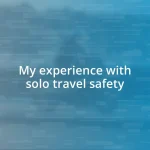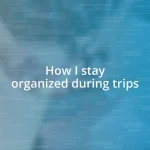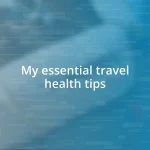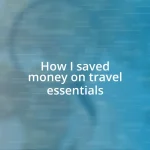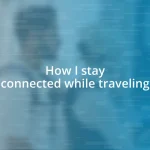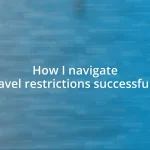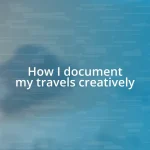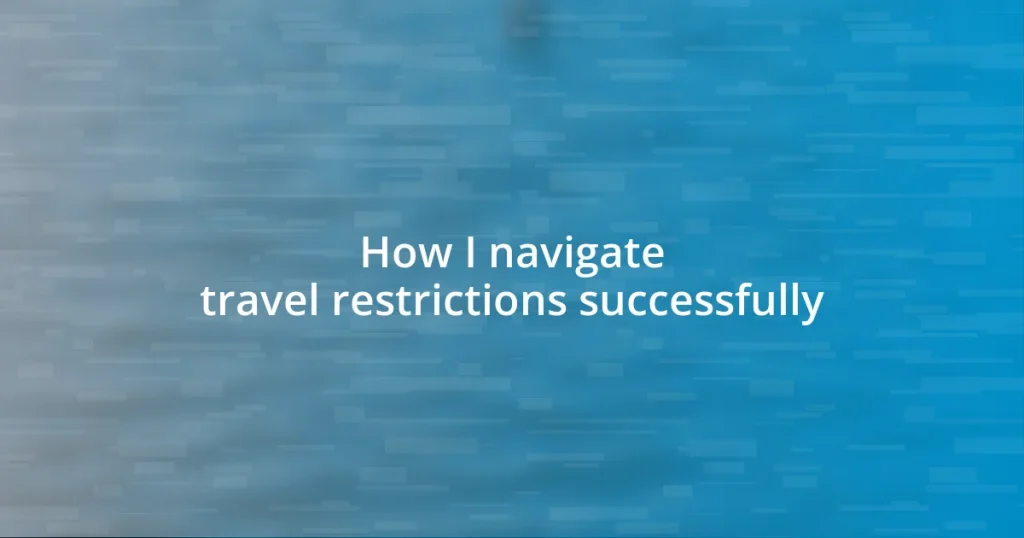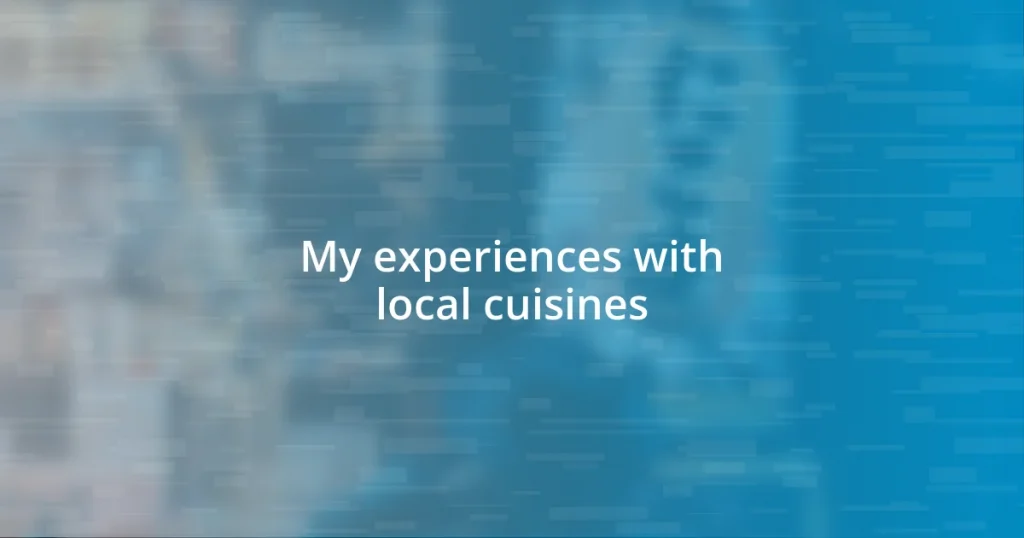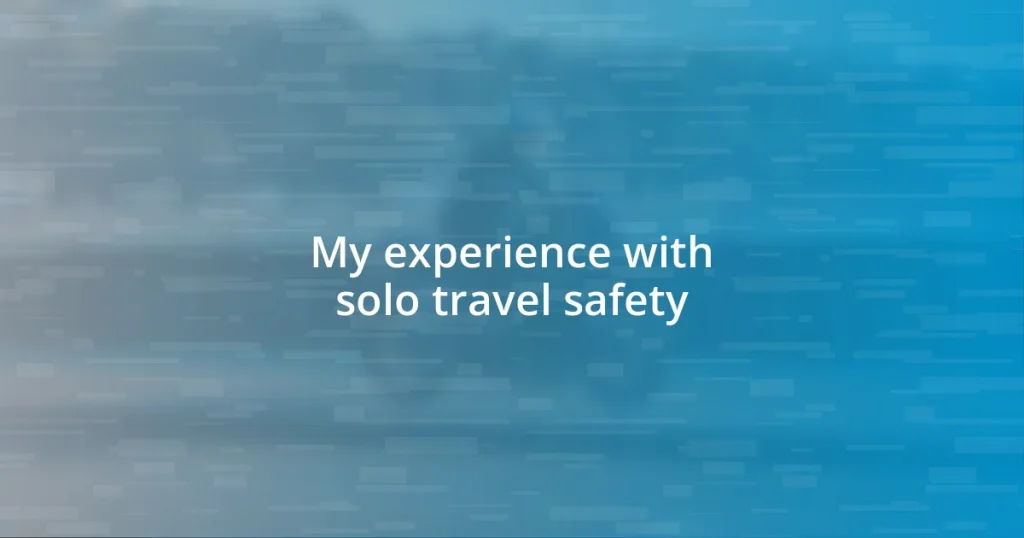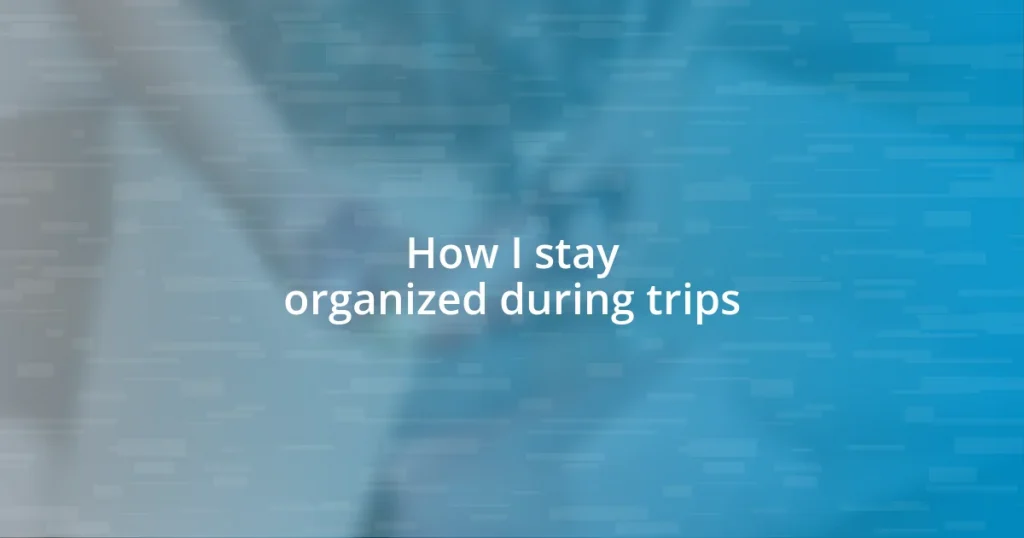Key takeaways:
- Travel restrictions change frequently, requiring resilience and adaptability from travelers to turn obstacles into opportunities.
- Utilizing official government sources, travel blogs, and news outlets is essential for accurate information on entry requirements and policies.
- Engaging with travel experts and sharing experiences with others can provide valuable insights and reassurance in navigating travel challenges.
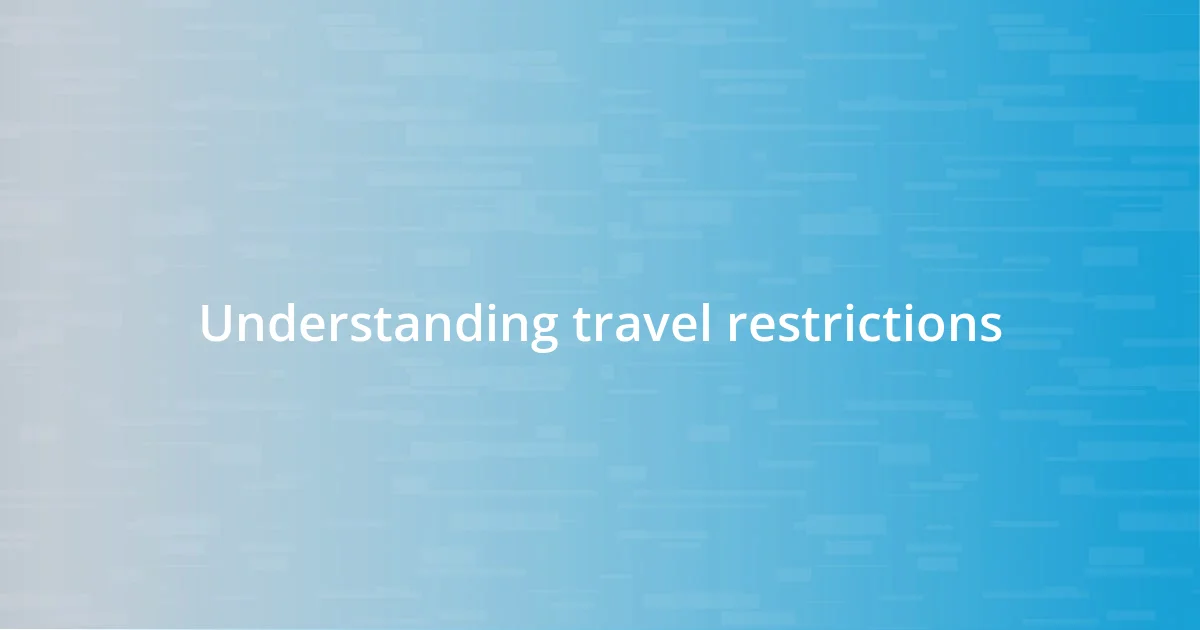
Understanding travel restrictions
Travel restrictions can sometimes feel like an overwhelming web of rules and regulations, can’t they? I remember planning a trip last year, only to find out that different countries had varying entry requirements, including vaccination proof and recent negative tests. It’s a bit like a puzzle, where one wrong piece can derail your entire travel plan.
As I dug deeper into understanding these restrictions, I found that they can change frequently—often with little notice. One moment a destination is open, and the next it’s closed to non-residents. This constant shift left me wondering: how can travelers stay informed without feeling like they’re on an endless rollercoaster of updates?
The emotional toll is significant, too. The anticipation of travel can quickly turn into frustration and disappointment when faced with unexpected obstacles. I often ask myself: what would I do if my plans fell through again? The key, I’ve learned, is resilience. Adapting to change and embracing spontaneity can turn travel restrictions into opportunities for new adventures, even if they’re not the ones I originally planned.
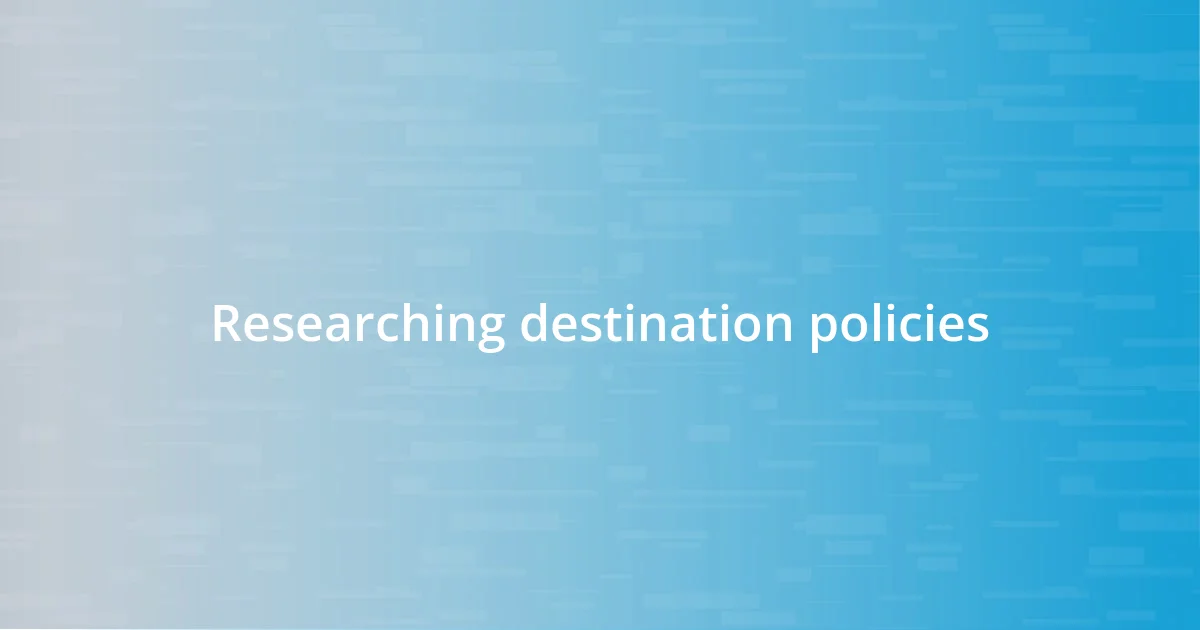
Researching destination policies
When it comes to researching destination policies, I can’t stress enough the importance of starting with official government sources. During my last trip, I focused on checking the country’s consulate website, which provided the most accurate information about entry requirements. It’s like having a trustworthy friend who keeps you updated instead of relying on social media, where misinformation can spread like wildfire.
I also discovered that travel forums and blogs can be incredibly useful. While preparing for a recent vacation, I most enjoyed reading experiences from fellow travelers who had recently visited the destination. Their insights not only highlighted what I needed to prepare but also offered comforting perspectives on navigating rules that seemed daunting at first. It felt reassuring to read about their adventures, making me feel less alone in my journey.
Lastly, I’ve learned to keep an eye on news outlets for updates about potential changes. For instance, when planning a trip during the pandemic, I set up Google Alerts for my destination to stay informed about any new policies. In my experience, this proactive approach helped me avoid last-minute surprises, making travel planning much smoother.
| Source Type | Benefits |
|---|---|
| Official Government Sites | Most reliable and up-to-date information |
| Travel Blogs and Forums | Real experiences and tips from travelers |
| News Outlets | Updates on policy changes and restrictions |
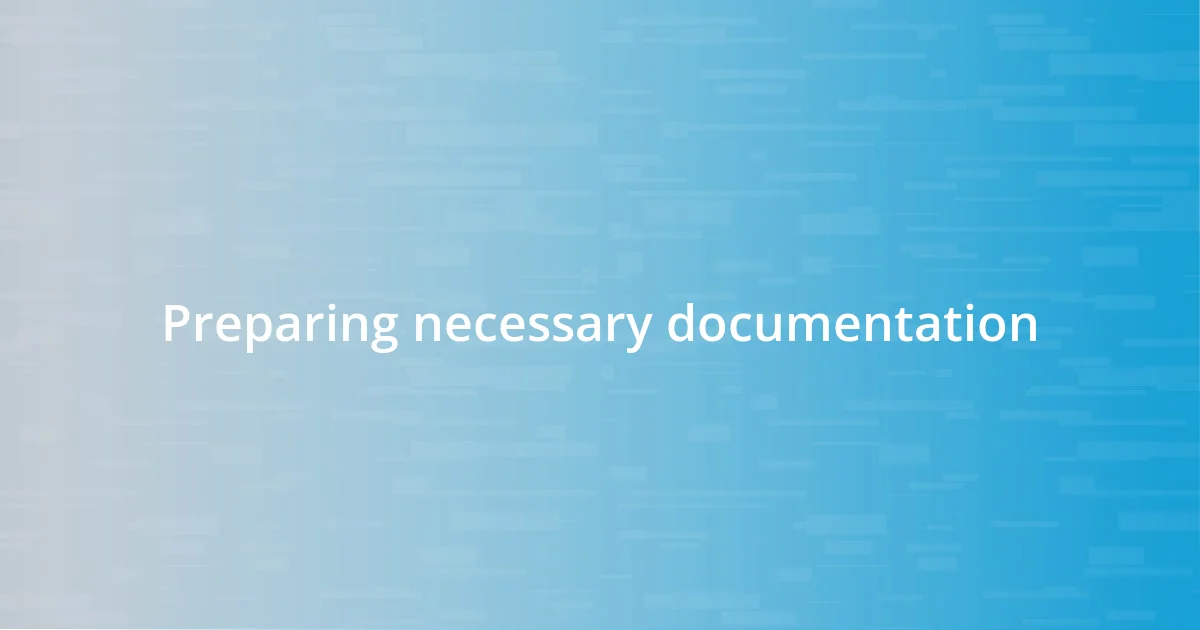
Preparing necessary documentation
Preparing necessary documentation
As I prepared for my last trip, I realized how crucial having the right documents was for a smooth travel experience. I made a checklist to ensure no detail was overlooked. It felt incredibly satisfying to cross off each item—like small victories leading to my adventure! The thrill of checking every box was paired with a bit of anxiety; one missing paper could stand between me and my destination.
Consider these essential documents I always prepare ahead of time:
- Passport: Ensure it’s valid for at least six months beyond your planned return.
- Visa: Check if your destination requires one and apply in advance if needed.
- Vaccination Records: Carry proof of vaccinations, especially if they’re mandatory for entry.
- Negative Test Results: Some countries still require recent COVID-19 test results, so have those handy.
- Travel Insurance: Documentation of your policy can save you heartache if plans change unexpectedly.
- Itinerary: A printed copy of your travel itinerary helps if tech fails you!
I cherish having everything in order. The act of compiling these documents not only sets my mind at ease but also allows me to focus on the excitement of discovering new places. Each piece of paper represents a step toward a much-anticipated journey, and with every checkmark, I can practically feel the stress melt away, replaced by the thrill of adventure waiting just ahead.
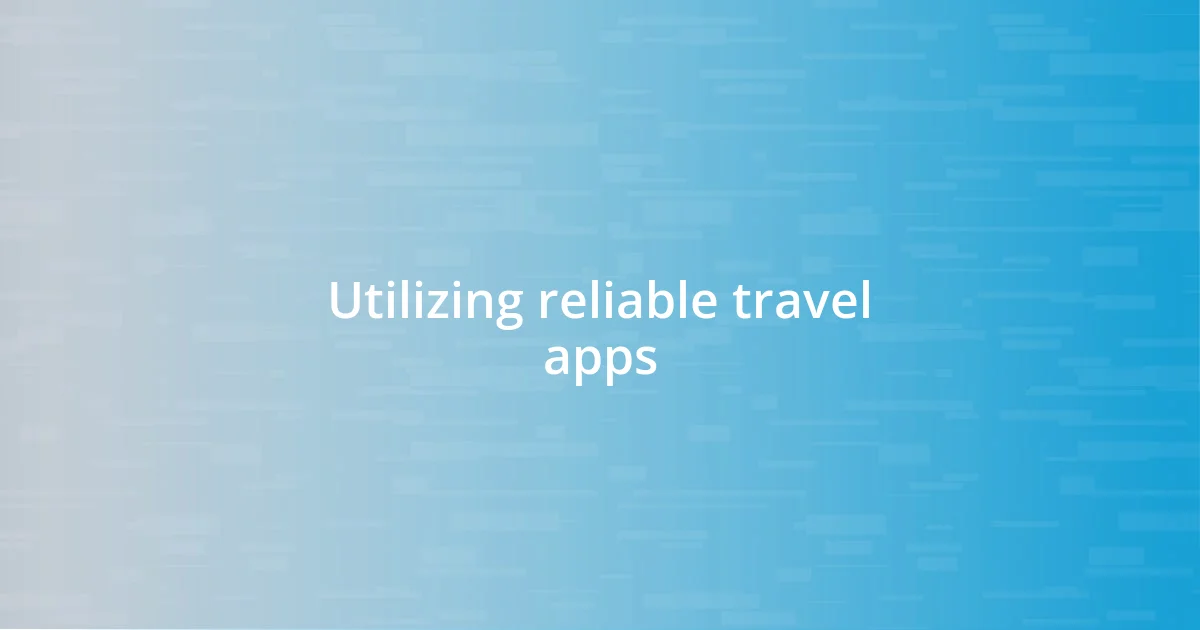
Utilizing reliable travel apps
When navigating travel restrictions, I find myself continuously reaching for reliable travel apps. One of my favorites is Skyscanner, which doesn’t just help with flights but also highlights travel restrictions worldwide. Imagine my relief when it flagged changes in entry rules for a last-minute trip I planned to Europe! It’s like having a personal assistant in my pocket, always alert to what I need to know before departure. It’s important to remember that each app may offer unique features, so I often try a couple to see which aligns best with my needs.
I also can’t recommend Google Maps enough. Beyond finding the quickest routes, it often indicates whether certain places are open or closed, which really helped me during my last vacation. I remember stopping at a famous local café that was supposed to be open, only to find it closed for renovations. Had I checked the app beforehand, I could have chosen a different spot. That little insight saved me not just time, but also the frustration of feeling sidetracked!
Ultimately, travel apps offer a layer of reassurance I didn’t fully appreciate until I experienced unexpected last-minute changes. In my research, I stumbled upon Hopper, which predicted future flight prices and helped me book at just the right time. Wouldn’t it be great to save money while traveling? This app has made planning trips easier, allowing me to feel in control even when the world feels uncertain.
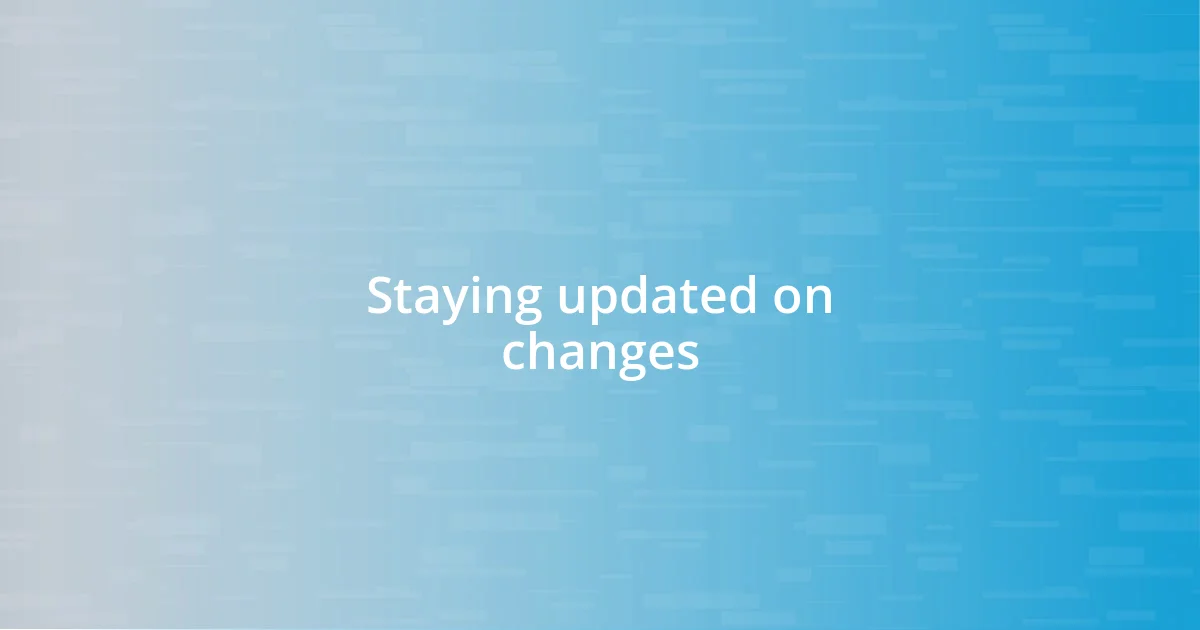
Staying updated on changes
Staying informed about travel restrictions can feel like a full-time job, but I’ve found a few strategies that truly work for me. I often subscribe to newsletters from trusted travel websites, and it’s surprising how quickly they update their information. Just last month, I received an email alert about a sudden change in entry requirements for a trip I was planning. Without that early notification, I might have faced a lot of stress at the airport!
In addition to newsletters, I regularly check official government websites. They may not be the flashiest, but they offer the most accurate and current information. I vividly remember reviewing my country’s foreign travel advice page before a trip to Asia; it mentioned updated health requirements just two days before I left. I felt a rush of gratitude to have caught that in time, sidestepping what could have been a costly oversight. How many travelers could benefit from checking these sources? Quite a few, I’d wager.
Social media is another invaluable tool in my arsenal. Following travel influencers or official tourism boards on platforms like Twitter has made a real difference. They often share real-time updates and insights that traditional news outlets might miss. During my last journey, I turned to Instagram stories and found a local influencer addressing recent border changes just hours after they were announced. I felt more connected and informed, and it reassured me that I wasn’t navigating this complex landscape alone.
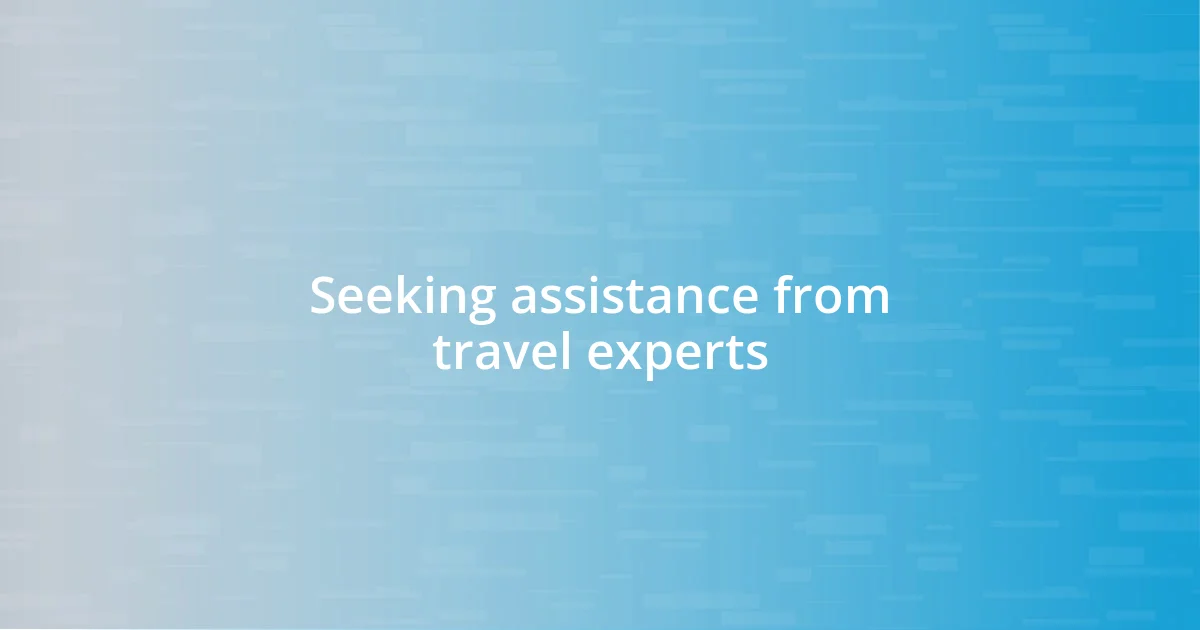
Seeking assistance from travel experts
When I really need to make sense of travel restrictions, turning to travel experts is often my best move. I remember planning a trip to South America, where the entry rules varied significantly by country. I reached out to a travel advisor who specializes in that region. Their insights not only clarified the complicated landscape but also uncovered lesser-known options I hadn’t considered. Isn’t it incredible how a conversation with an expert can open new doors?
I’ve also found that engaging with travel consultants gives me peace of mind. Once, while organizing a trip during the pandemic, I expressed my anxiety about changing regulations. My consultant eased my worries by explaining which updates to monitor and how to be flexible with bookings. It was comforting to know I wasn’t going through this alone; they even shared tips on navigating potential quarantine rules. Who wouldn’t feel better with a knowledgeable ally by their side?
Incorporating expert advice has turned what could be a confusing process into a collaborative exploration. For instance, during my planning stages last summer, I learned about an upcoming festival I would have missed if not for a travel blog. The expert had highlighted cultural events alongside travel safety tips, making the experience richer and more satisfying. Have you ever been surprised by the value an expert can add? I know I certainly have!

Sharing experiences and tips
Sharing my travel experiences has proven to be incredibly beneficial, not just for me but also for those around me. I often find myself in conversations with friends who are planning trips, and I can’t help but share the unexpected hurdles I navigated when traveling to Europe last summer. I vividly remember the panic while figuring out the local health protocols for each country on my itinerary. After sharing my experiences, I’ve seen friends feel more empowered to tackle their own travels, especially when they realize they’re not alone in facing these challenges.
Connecting with fellow travelers online has also enriched my understanding of navigating restrictions. I frequently engage in travel forums where people share up-to-the-minute information about their own journeys. A recent post caught my eye; a traveler documented their experience with a last-minute change in entry regulations that almost derailed their trip. The detailed breakdown they provided was a goldmine—I adopted their strategy of getting necessary documentation before departure and it saved me time and hassle. Isn’t it wonderful how a shared story can spark practical solutions?
I can’t stress enough how documenting my own travel experiences has created a valuable resource for others. I’ve taken to writing brief blog posts detailing my encounters with testing requirements and quarantine rules. In one post, I discussed an instance where I almost missed my flight due to a misunderstood rule. By sharing my missteps and the corrections I learned, readers often tell me they felt reassured when navigating similar situations. It’s heartwarming to know my journey can help someone else avoid the same pitfalls—who wouldn’t want that sense of connection in an often-distant world?


